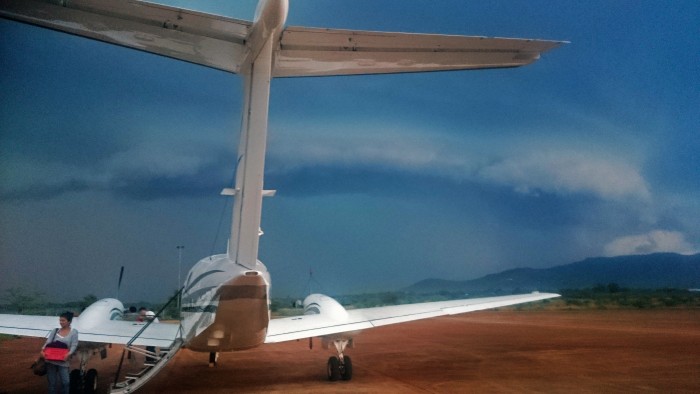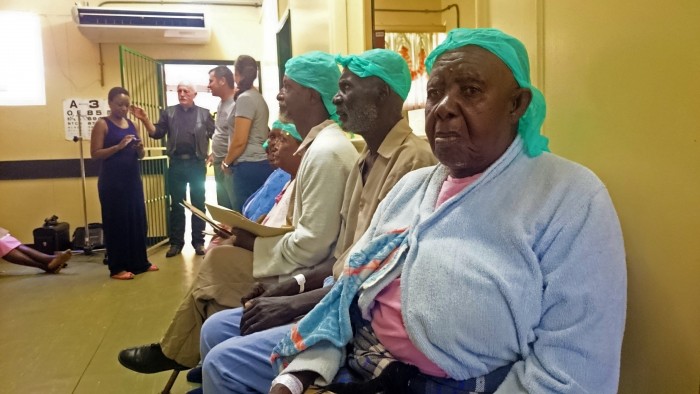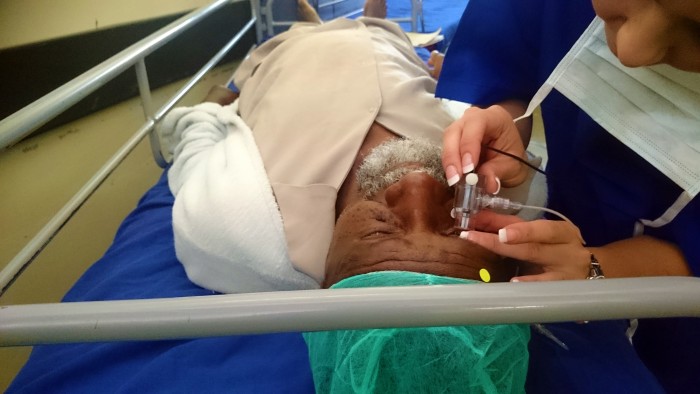Fifteen elderly members of the Thohoyandou community sat on the bench in the reception area of the Donald Fraser Hospital. As we entered the room no one turned to acknowledge our presence. They simply sat, calm and peaceful – unperturbed by what was happening around them. Given their age and status within their community this may not seem strange, but in this case, the lack of interaction was also due to the fact that these people had severely impaired eyesight. Today, this was going to change.
Several hours earlier I had excitedly boarded a plane headed for the remote Vhembe District in Northern Limpopo. The 9 passengers included doctors and nurses, who were going to perform much-needed cataract surgeries on patients. We ended up leaving an hour late after we had nervously watched a radar image of a storm which had lingered over our destination threatening to end the trip.
After landing safely in Thoyandou, we learnt that our well-meaning taxi driver was waiting for us in Polokwane (2 hours drive away) as he thought the rain would have forced us to reroute our flight there. Thankfully we were rescued by the lone security guard who left the airport unguarded as he ran off to find us transport. Thirty minutes later we were on our way to the Donald Fraser Hospital in a brand new, shiny Toyota Quantum.
On our arrival at the hospital, I could sense that this day would be a significant one for those 15 people waiting in the reception area. Donned in doctor’s scrubs I excitedly took pictures and chatted to the volunteers while the patients were carefully tested to determine the size of the new perspex lens required for their eyes. Following measurement, the patients were administered a local anesthetic. After this, the patients were led, because they could not see, to beds where they would wait for their surgery.
The patients were silent and motionless while lying on their beds in nervous anticipation of the surgery. The procedure is all the more daunting as it is done while the patient is awake. The volunteer doctors and nurses were wonderfully encouraging while performing their duties. Although this volunteer team only does this once a month, they are efficient and professional.
By the end of the day, the two volunteer doctors had removed 15 cataracts from blinded eyes, replacing the deteriorated lenses with perspex ones. All equipment used by the doctors is donated. Complex equipment such as hospital beds, microscopes, and the lenses themselves have all been collected over the years, enabling the team to effectively do their job and help people for free.
Within a day after surgery, the patients can see normally, removing the need for them to be led as they previously needed to be. Not only does regaining their eyesight benefit each patient tremendously, but it also has a significant benefit for their families – as many of the older ladies still care for extended families members.
With the day’s work done, we headed back to the plane in a jovial mood. It’s a tough day that starts early and ends late, but the day’s work has changed the lives of over 300 families since the beginning of the project.
After a turbulent ride back to Johannesburg, and a couple of glasses of wine later – to relieve the stress of flying in a small plane, it was great to reflect on my experience and the fact that I had been part of something that really changes people – both those being helped and those doing the helping.




Login or Register with one of the options below